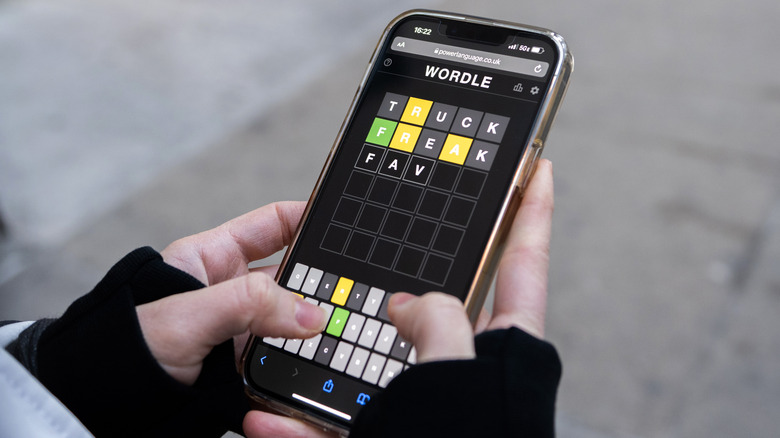The Daily Word Game That's Going Viral On Social Media
You may think you know the most popular game at the moment, but we'll only give you six guesses. That's right: A new word game is all the rage, starting 2021 off on a smart note. Some games flop immediately and never make an impact on the gaming scene, but some transcend and reach people of all ages and demographics. Such is the case for Wordle.
Games look different over time, and word games are no different. According to The Paris Review, people have played word games for a lot of recorded history, including in Ancient Rome and Greece, for example. However, word games as we know them today are modern inventions. The crossword puzzle wasn't created until 1913, and the barrage of word game apps on mobile phone app databases is a contemporary phenomenon. Most of the time, people seek out word games, but sometimes, when the game hits just the right nerve, it becomes a sensation.
Enter Wordle, the daily word game where you have to guess a five-letter word in six or fewer guesses. In each guess, your letters will be either grey, yellow, or green. If grey, that letter isn't in the word at all; if yellow, it's in the word but in the wrong position; and if green, it's both in the word and in the right position. From there, each guess should help you narrow down until you get the word. Six guesses isn't a lot, but it makes the game the perfect balance of challenging and rewarding.
Wordle goes against gaming conventions, per its creator
If one of your New Year's resolutions was to continue learning and testing your brain, Wordle is for you. Wordle tracks your progress, showing your streaks and statistics at the end of your guesses each day. The streak feature holds people accountable. Just one word a day keeps the game from getting stale and makes people look forward to it.
Wordle was invented by Josh Wardle, a software engineer based out of Brooklyn, New York, who released it in October (via Slate). It then gained traction in December, leading to its spikes in popularity in January. Recently, Wardle appeared on Slate's podcast, "Spectacular Vernacular," where he explained the reason he created Wordle. "The goal with Wordle actually was to create a word game for my partner to play," he explained. "She and I got really into the New York Times crossword, and she plays a lot of Spelling Bee as well."
On why he thinks the game is so popular, Wardle shared that he likes to go against the grain of typical gaming conventions. He used to work in Silicon Valley, so he's aware of what makes people typically interested in games. "And philosophically, I enjoy doing the opposite of all those things, doing all the things that you are not meant to do, which I think has bizarrely had this effect where the game feels really human and just enjoyable." Ultimately, Wordle is the pandemic's latest phase (R.I.P. the sourdough era), and its lack of monetization keeps it fun, too.

